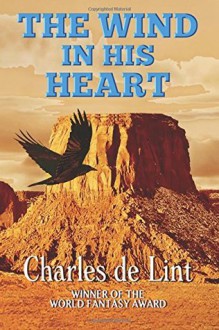
It’s interesting how authors who start their careers writing atmospheric, mystical books about the intersection between magic and reality seem to become increasingly paint-by-numbers as their careers progress. Juliet Marillier followed this pattern, going from my favorite author with her original Sevenwaters trilogy, to churning out trite and recycled stories fifteen years later. Of De Lint’s work, I’ve read only his first book, Dreams Underfoot – a short story collection I enjoyed – and this, his most recent. This one is kind of fun as an escapist, plot-driven novel, but the characters and setup are unconvincing, and the emotions it elicited in me ranged from mildly entertained to moderately bored.
This story is set in Arizona, on and around the reservation of a fictional Native American tribe which lives alongside an ancient tribe of shapeshifters. Steve, a retired rock star living in the desert nearby, finds a teenager, Sadie, abandoned in the desert, and brings her to the reservation to seek help, but Sadie is a traumatized and troubled kid who sows chaos in her wake. Meanwhile, when a customer at a local hunting lodge inadvertently kills a shapeshifter, the traditional and entrepreneurial factions on the reservation are thrown into conflict. Besides Steve and Sadie, the other major point-of-view characters are Thomas, a local boy who wants to see the world but is under pressure to become a shaman, and Leah, a music blogger who comes looking for Steve after Sadie tips her off to his location.
It is a fast-paced book, in the sense that there are many relatively short chapters with lots of dialogue and that the action moves quickly, with chapters often ending on cliffhangers. Unfortunately, the characters are simplistic and unconvincing from the get-go, all too ready to share their deeply-held secrets or revise their outlooks on life at the drop of a hat, and bizarrely uninformed about their own close-knit community. Somehow Thomas doesn’t know that his boss spent several years living elsewhere (though there’s no indication this is a secret) or that his sister also sees into the otherworld (which for a supposedly deeply held secret on both of their parts, comes out awfully easily in casual conversation as soon as the book begins). Steve is even worse, being somehow unaware that anything unusual is happening even though he’s lived there for 40 years – in a trailer that is invisible to outside eyes, and with a girlfriend who, in an attempt to hint that she might not be entirely human that somehow went right over Steve’s head, has antlers and sometimes (but not always) a tail.
Steve’s bizarre ignorance is representative of the world of the book generally. The accidental killing of the shapeshifter happens because the entrepreneurial Sammy, a tribal member who grew up on the reservation and owns the hunting lodge, also somehow doesn’t believe in the shapeshifters. It’s unclear how this can be when they are more than willing to reveal themselves to him and beat him up, and for that matter when others on the reservation are perfectly willing to tell strangers who showed up on their doorstep five minutes ago all about their not-quite-human neighbors. In TV Tropes terms, the world is presented as if shapeshifters conceal themselves through a Masquerade, but in what we see throughout the book there is zero actual attempt at concealment and plenty of volunteering information.
Meanwhile, none of the POVs are really the central characters in this story or the ones driving it forward, unless you count Sadie’s acting out. The story is actually about the tribe and the shapeshifters, but three of the four POVs are white people from elsewhere, and they feel a little shoehorned in. Even Thomas, who is a tribe member, is an almost entirely reactive character, never driving the action. Steve is appointed “the arbitrator” of the shapeshifter community, which does not feel particularly earned and edges close to white savior territory in a book that otherwise manages to avoid the worst racial tropes. Leah has little reason to be in the book at all, other than to provide a connection to Newford, the fictional city where much of De Lint’s work is set. She arrives obsessed with Steve’s band because she wants to know why their music didn’t save her best friend, also a fan, from suicide, at which I can only wonder why she would have expected some band’s music to save someone from crippling anxiety and a negative self-image. Then she easily replaces this preoccupation with blogging about the plight of migrants crossing the border, which is even weirder since she never meets a migrant, just some old guy who tells her this is a worthy cause.
At any rate, this made for good cotton candy reading, exemplifying my favorite quote about how readers sometimes get sucked in, even when we know better: “That’s the problem with fiction — or the charm, if you want. Even mediocre plots have a way of sinking their hooks into you, until you find yourself concerned for the fates of characters who aren’t even fully convincing.” Put another way, there’s plenty of craft here – cliffhangers and tense situations to keep the reader going – but precious little magic. It could make a fun beach read, but don’t expect more.


 Log in with Facebook
Log in with Facebook 









